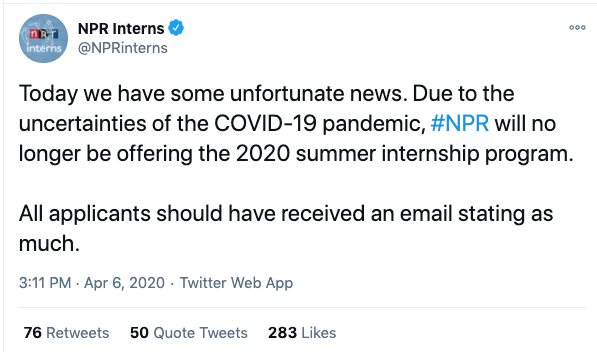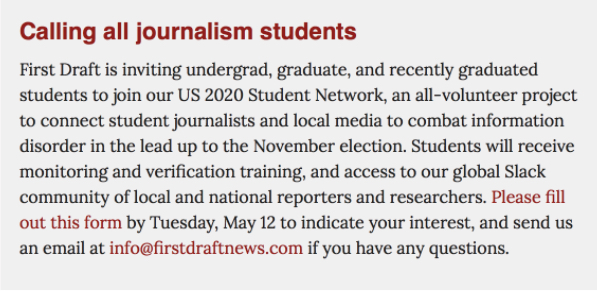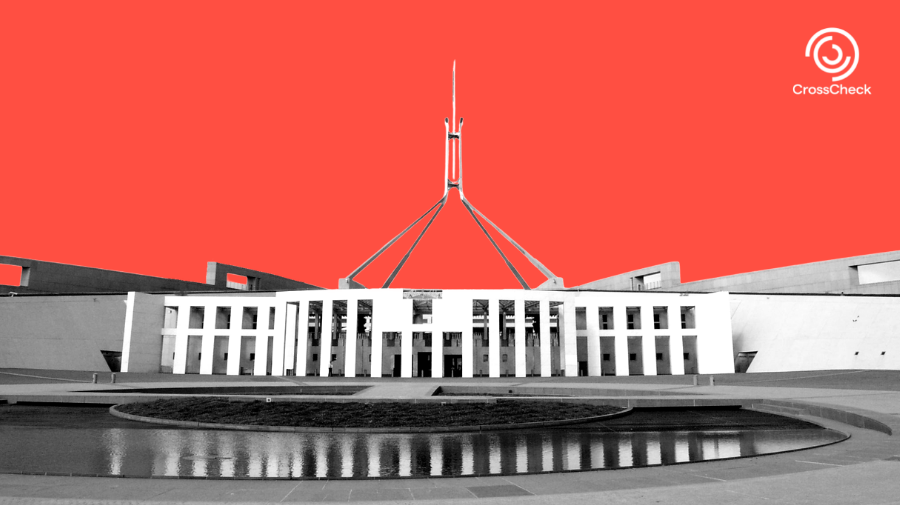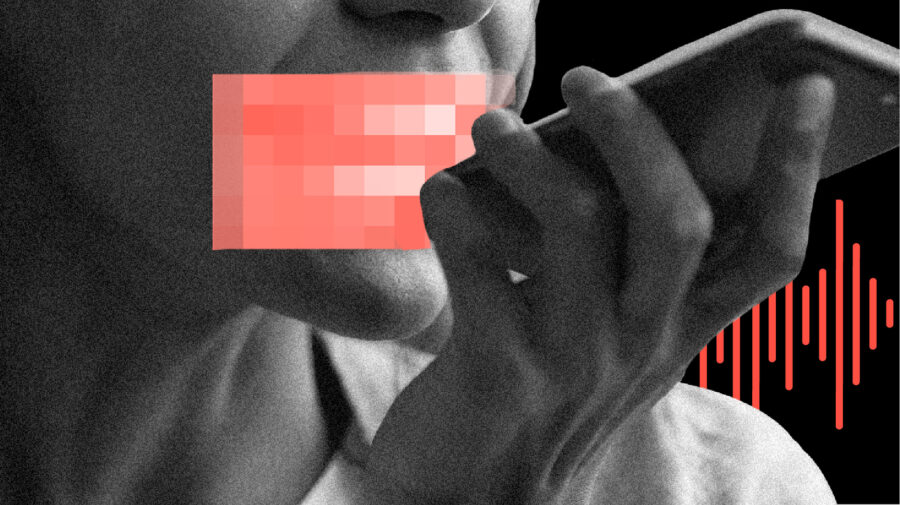Diara J. Townes is First Draft’s community engagement lead for the US bureau who developed, strategized, and guided the US 2020 Student Network from June to November, coordinating support, training, and output between volunteers and the organization.
The coronavirus pandemic and the lockdowns that came with it disrupted life for nearly everyone, and student journalists were no exception. After campuses, offices and businesses began shutting down in March, students and recent graduates across the US began to receive word that the summer internships they were counting on would be canceled.

Katrina Janco, a recent graduate of the University of Pennsylvania, applied for a summer internship in journalism. “I got a message a day or so later saying, ‘I’m sorry we aren’t taking anybody because of COVID,’” she said.
Meanwhile, the infodemic — the overload of mis- and disinformation around the coronavirus pandemic — was challenging newsrooms across the country. A looming election threatened to compound the information disorder already faced by journalists. To meet these challenges, First Draft launched a program that would support both student journalists and newsrooms: the US 2020 Student Network.

The First Draft Student Network, with summer and fall sessions that ran between June and November, was an all-volunteer effort with a collaborative objective. More than 40 students — most working in the US but several of them based abroad — researched, tracked and verified online mis- and disinformation, supporting the research needs of First Draft’s community of local and national newsrooms and journalists.
“I think one of the most interesting things about working with First Draft is learning about how misinformation works and how misinformation spreads,” said Lauren Hakimi, a junior at Hunter College. “I feel like when I become a professional journalist and if I were to report on elections, then I’ll know how to do it because I had this experience at First Draft.”
To prepare students for the network, First Draft’s investigative research team trained them on critical topics, including tactics bad actors use to manipulate information, digital verification tools, how to assess a social media post’s spread and virality, and the role of media in the amplification of unconfirmed rumors. The training sessions were recorded to make the learning experience accessible to all who participated.
Volunteers kept track of their research in personalized documents and shared their insights in Slack and on Junkipedia, a growing misinformation database from the Algorithmic Transparency Institute at the National Conference on Citizenship. Their research tasks, which we created and assigned alongside First Draft’s community engagement intern Isabelle Perry, evolved as newsroom needs changed, a frequent occurrence in 2020. Perry checked in on the students’ work every week, noting which assignments piqued student interest and which standout posts were shared into First Draft’s wider Slack community.
At the outset of the project, Megan Fletcher from The University of Texas at Austin uncovered a tweet that said the US Postal Service would not deliver ballots to election officials unless they were sent in envelopes with two stamps. The user captioned the post with, “If you are voting by absentee ballot, you need two forever stamps! The envelope does not make that clear. Remember, two stamps!!” Fletcher’s find was an early example of a prominent post illustrating confusion around mail-in voting, alerting First Draft’s research team to a nascent potential misinformation narrative. As we saw leading up to — and after — the election, the record number of mail-in ballots cast by Americans went on to become the subject of a staggering degree of misinformation.
Misinformation was also driven by fears of political violence months before the election. Ahead of a rally by President Donald Trump in Tulsa, Oklahoma, in late June, Ngai Yeung from the University of Southern California shared tweets from users warning about competing groups of protesters and pro-Trump bikers convening on the rally, stoking fears of a violent clash. The scuffles that ensued at the rally were a reminder of the value of social media newsgathering and verification skills in a context of heightened political tension.
The impact of student research occasionally reached beyond the scope of the US. Sarah Baum from Hofstra University contributed to First Draft’s regular briefings to the United Nations Verified campaign with her findings on the #ExposeBillGates Global Day of Action, when social media actors around the world promoted debunked falsehoods about Gates and vaccines.
While research by students was showcased in a weekly newsletter, some of the students’ work was also featured in First Draft’s US 2020 newsletter, which reaches hundreds of journalists across the country. This gave students the opportunity to see how their research informed local media’s understanding of online misinformation.
“I wanted to do something where I felt like I was helping people,” Baum said. “Battling disinformation about a deadly pandemic or about elections is something that I think is a very important public service.”
Over the summer, students shared more than 200 posts in Slack. When the Student Network relaunched in September after a post-summer break and with a new focus on election misinformation, a dozen students contributed more than 100 posts through November 6 and supported both local and national newsrooms as part of ProPublica’s Electionland project.
“The First Draft Student Network was an incredible opportunity for our students to develop critical skills in social newsgathering and verification in a real-world setting,” said Dr. Carrie Brown, the director of the social journalism program at the Craig Newmark Graduate School of Journalism at CUNY. Students in her program joined the Student Network to support First Draft’s partnership with ProPublica’s Electionland project.
“Even though we couldn’t physically gather in a newsroom due to Covid-19, they were able to be a meaningful part of election coverage. At such an important moment in this country’s history, several of them told me they were grateful to have something to do that would make an impact besides just watching Steve Kornacki.”
Verification has long been at the heart of what journalists do,” she continued. “But understanding how to identify and combat misinformation in a responsible way that avoids inadvertently amplifying it is a critical skill for any journalism student today, and it has helped many of our alumni get hired.”
The skills the volunteers sharpened this summer have already lent themselves to a few emerging journalists. Lauren Hakimi from Hunter College was selected as a Hearken Election SOS fellow, drawing on the skills she developed as a Student Network volunteer to support a newsroom in Michigan.
“Before First Draft, I didn’t know anything about monitoring, service journalism, or how misinformation spreads,” she said in an email. “I’m so grateful to have had the First Draft experience and I certainly won’t forget it.”
Francesca D’Annunzio, from The University of Texas at Austin, began work as a full-time reporter covering election problems and misinformation in North Texas in September. “A lot of people think that non-citizens are consistently heading to the polls — even in our county. And they are worried about voter fraud via mail ballots,” she shared via Slack, highlighting narratives she saw taking shape over the summer.
First Draft and its partners were humbled by the energy, ingenuity and adaptability of the Student Network volunteers. For many, 2020 didn’t go as planned, but we hope that the emerging journalists who collaborated with us still feel called to work in this challenging but critical profession.
Isabelle Perry contributed research and reporting to this article.
We haven’t announced our plans for Summer 2021 student programs but interested students should follow @FirstDraftNews for any news to come on spring and summer internships.






